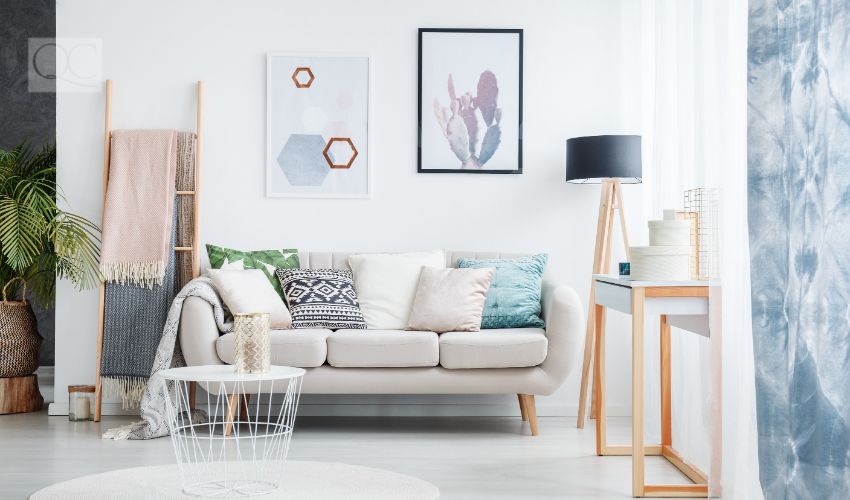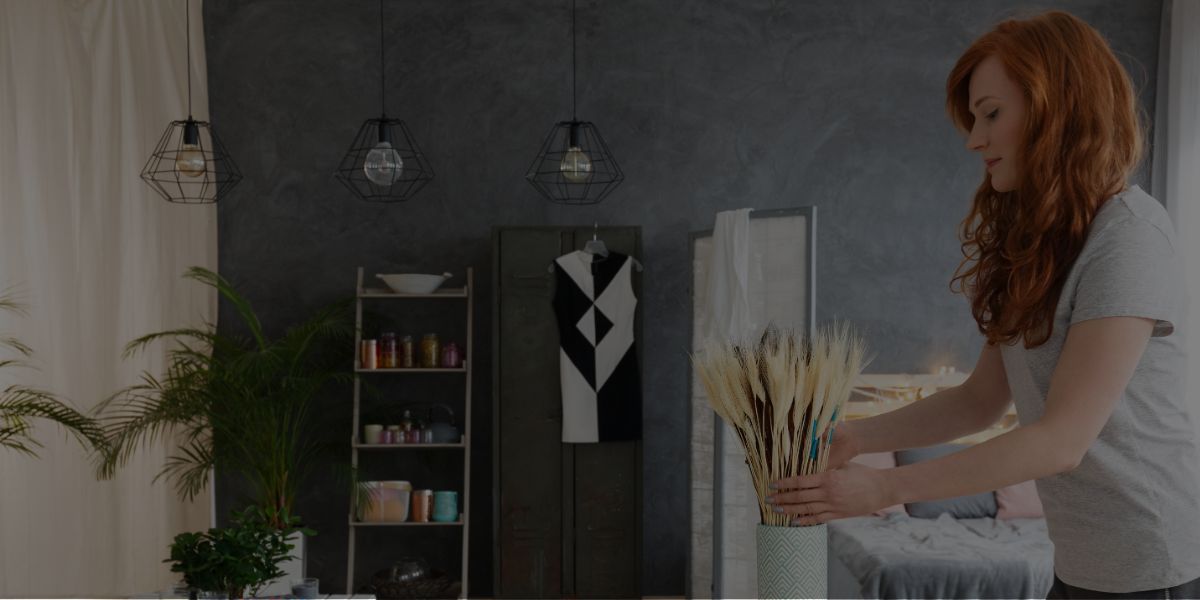Do you want to know how to start an interior decorating business of your very own?
You’re not alone!
In fact, many interior decorators aspire to be their own boss… and this makes total sense! After all, the freedom that comes with running your own business, setting your own rates, and choosing your clients is seriously desirable. Not to mention, it’s also incredibly rewarding!
So, how can you actually turn this dream into a reality?
You’ll need to build a foundation that includes completing an interior decorating course, possessing specific personality traits, and knowing which elements you need to launch your business.
Luckily, we’re here to help provide ALL of this information, right here in this article! Read on for our full guide on how to start an interior decorating business, and get ready to start the career you’ve always wanted!
Did you know that we’ve also put together the ULTIMATE GUIDE on becoming an interior decorator? Check it out here!
Do You NEED Certification Training?
In most places, interior decorating is an unregulated profession. This means that you don’t technically need a degree or certificate to pursue a career as a home decorator. However, never discount the value of a design certification!
As with any professional career, there’s a certain level of education and experience required in order to be successful. Typically, aspiring decorators begin their career by enrolling in an interior decorating course. This is an excellent place to start for those who have no prior training and so this is what we recommend!
Employers and clients will be impressed to see that you’ve gained the necessary knowledge and skills taught through a recognized program. Moreover, your certification training will prove how committed you are to learning more about the industry. Plus, an interior decorator certification will set you apart from your competition in a big way!
In addition to proper design training, you’ll need a solid foundation of interior decorating experience. If you’re just starting out, you can volunteer your services to friends or family. Another option is to work as an assistant to an established interior decorator.
The more hands-on experience you have, the better shape you’ll be in when it comes time to launch your interior decorating business. So, take every opportunity at your disposal in order to hone those skills!

QC Design School’s Interior Decorating Course
Your Interior Decorating Course with QC Design School will start off by teaching you the basics of color theory and design styles. From there, you’ll move on to more in-depth units that focus on color schemes, arranging furniture, and working with clients.
A bonus for self-starters: there’s even a full business unit at the end of your QC program. This unit will teach you how to start your own interior decorating business. As a result, you can become your own boss once you’re internationally-certified!
The best part?
You get to complete your training all from the comfort of home, at your preferred pace! Many of our graduates found that by devoting a mere 1-2 hours per week on their studies, they were able to finish and earn their certification in as little as 3-6 months.
Learn all about QC’s Interior Decorating Course here and get started today!
Interior Decorating Business Launch Requirements
It goes without saying that interior decorators are detail-oriented. You need to have a sharp eye for colors, furniture arrangement, and style in order to create beautiful spaces!
When it comes to starting a business, there are a multitude of pieces that need to be organized. As such, your keen eye for detail is going to be incredibly useful. As you venture into the world of business ownership, it’s important to recognize that you’re on your own (for the time being, anyway).
Thus, you won’t have the luxury of administrative staff to help you out with daily tasks. Of course, that’s not to say that you won’t hire some help in the future. But for right now, it’s a one-person company.
Must-Dos
You’ll need to check off a few key things on your to-do list if you want to get your interior decorating business off the ground. Some of these things include (but aren’t limited to):
- Legally registering your official business name
- Setting up your business website
- Establishing a strong social media presence
- Putting together a strong interior decorating portfolio
- Securing an office space and necessary supplies
- Getting a business license, if required (do your research to find out if one is needed in your area)
- Getting business insurance
- Putting together a list of your prices and design packages
- Developing templates for clients that have been checked by a lawyer and are all set to be used
All of these items (and more) should be part of your business start-up plan. And, as mentioned above, an interior decorating course will teach you how to organize these elements and put the wheels in motion to start your business.

Personality Requirements for an Interior Decorator
Education, experience, and being business-savvy are all important elements of starting an interior decorating business. However, in addition to that, it takes a certain type of person to be a both business owner and professional decorator!
Here are 3 critical soft skills needed in order to be successful in this area of the home design industry…
1. An Outgoing Nature
Interior decorating is predominantly client-focused. Decorators interact with people every day, be it in-person, over the phone, or online. Thus, an outgoing personality – and one that puts clients at ease – is vital to succeed as the owner of an interior decorating business.
Not only will you be able to get to know your clients on a personal level; you’ll also be able to establish a level of trust that’s key to building your business’s reputation.
2. Ambition
Any entrepreneur will tell you that it took a great deal of hard work, drive, and self-discipline to establish their business. You need to understand just how much you’ll need to hustle if you want to get your interior decor business off the ground.
Make no mistake: this is a huge undertaking – and it’ll require you to change your lifestyle and shuffle some priorities.
Managing your time properly is also essential. After all, you’ll need to maintain your website, social media accounts, and client appointments, all on your own. Having an innate drive to succeed, combined with a healthy dose of ambition, are personality traits that’ll take you far as a business owner.
3. Thick Skin
We’re not going to sugar coat things for you – starting an interior decorating business (or any business, for that matter) is not an easy feat. Sometimes, things will not go according to plan. You need to be both adaptable to that possibility, and resilient enough to keep going.
Creating a successful business won’t happen overnight. So, it’s important to have certain goals in mind and stick to them… Even when it seems as though nothing is going right. If you encounter a bump in the road, take a step back and try another way of doing things.
Also, maintaining realistic expectations as a business owner will help you manage stress and keep calm under pressure. For instance, you can’t expect to get dozens of clients right off the bat. Don’t beat yourself up if it takes a few years to get to the level you want.
Enjoy the process!

4 Tips for Starting an Interior Decorating Business
Okay, now that you have a solid idea of the type of training and personality traits you’ll need to thrive as a home decor business owner, what can you do to actually get your business started?
These 4 tips are an excellent place to start!
Build an Interior Decorating Portfolio
Your professional design portfolio will be like a living, breathing representation of your skills and expertise. When clients are looking to book an interior decorator, they’re going to expect to be able to see examples of your work before actually hiring you.
If you DON’T have a solid portfolio under your belt, you’ll wind up turning the majority of potential clients away – often, before you even have a chance to speak with them!
While you can absolutely have a physical copy of your portfolio on hand, it’s also important for your portfolio to live on both your business website and social media channels. The easier it is for people to access and view photos of your work, the more likely they’ll be to make contact and book with you!
If you’re brand-new to this industry and need help developing your portfolio, here are some quick tips to help make the process a bit easier:
- Offer complimentary interior decorating services to friends and family
- Provide decor services for a stylized photoshoot
- Lend your decorating expertise to not-for-profit and/or charitable causes
- Take high-quality pictures of decorating projects completed within your own home
Fun Fact: QC Design School’s Accelerate Your Business Workshop will teach you EVERYTHING you need to know to develop a killer portfolio. You can find the full details on this online course here!
Start Networking with Local Businesses
Efficient networking will be one of the single greatest assets to your career, especially when it comes to having a long-term, successful business. When you connect with others and grow your professional relationships, you’re increasing your chances of being referred to prospective customers.
Furthermore, you’re building your own list of preferred vendors and suppliers. These are people/businesses who may be able to help you bring a client’s vision to life down the road! It’s extremely common for people within the home design industry to collaborate together on projects.
Who knows… You may wind up building a rapport with a color consultant or home stager, and work with them on a number of jobs throughout your career!
The point is: networking is essential for success. So, jump on any opportunities you have to forge positive relationships with others in your industry.

Ask Friends and Family for Referrals
Another common thing prospective clients will look for when browsing your website and/or social media (especially for the first time) will be testimonials from past customers. But when first launching your interior decorating business, you probably won’t have any paying jobs to your name yet.
So, how are you supposed to gather these necessary reviews? Moreover, how can you find new clients and begin filling up your calendar with bookings?
Your friends and family might once again be able to help!
Firstly, if you provide your subject-matter expertise to the people you know personally, you can then ask them for testimonials once your work is complete. These testimonials will be a great addition to your website and social media! Secondly, you can also ask your friends and family to refer you to people they know who might be in need of a professional decorator.
There are countless entrepreneurs who were able to gain traction and get their businesses off the ground, thanks to a little assistance and word-of-mouth from their inner circle. So, as you begin this exciting journey, don’t be afraid to reach out to people you trust and see if they can help get your name out there.
Chances are, they’ll be more than happy to do so!
Build a Personal Brand
If you want to know how to start an interior decorating business, there’s no better place to begin than by figuring out your brand. Every solid business has a brand. By “brand”, I’m referring to:
- Thoughts, feeling, and/or emotions you automatically think/feel when that business comes to mind
- Colors and/or aesthetics associated with that business
- Moods and/or tones associated with that business
- Goals and overarching messages that business is known for supporting/having, etc.
Famous Brand Examples
For example, Wendy’s is known for their “always fresh, never frozen” burgers. However, in recent years, they’ve also become known for their hilarious social media presence on Twitter. Nike, while known for their footwear, is also equally known for their inspirational athletic messages.
You get the idea!
When you develop a strong, memorable, and consistent brand for your interior decorating business, it’ll be that much easier for people to not only remember you – but remember you in a positive way.
If you’re not sure how to go about developing your brand, here are some questions you can use to begin brainstorming:
- Would you like any particular colors/aesthetics to be associated with your business?
- Do you have a specific target clientele?
- Do you want to specialize in decorating certain areas of a home, or would you prefer to offer as many services (in as many parts of the home) as possible?
- Is there a particular tone of voice (e.g. motivational, humorous, etc.) you’d like people to associate your business with?
- Do you have some kind of niche that your interior decorating business could be known for, such as eco-friendly decor, e-design services, etc.?
- Do you want your business to have some sort of message/goal?
- Are there any social justice causes you’re passionate about, that you’d like your business to likewise stand for?
These are all questions that, once figured out, will help you develop your brand!

The Key Takeaway
Rome wasn’t built in a day. Likewise, starting an interior decorating business will not happen without hard work.
Knowing the education and experience required to set yourself apart as an interior decorator is a great start. Understanding how to find proper business training (and then getting it) is also critical.
From there, all you need to do is work hard, be patient, and be yourself. The rest will fall into place, and success will find its way to you!

Very insightful piece and thank you for the advice. I will keep refreshing myself with these tips to apply them as I move towards actualizing my passion.